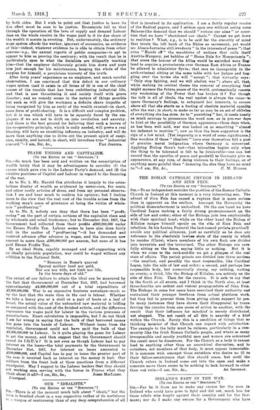TRADE UNIONS AND CAPITALISM.
[To THE EDITOR OF THE " SPECTATOR."] SIR,—S0 much has been, said and written on. the conscription of wealth lately that it may be advantageous to consider (1) the causes which gave rise to the Labour Party's demand, and (2) the relative positions of Capital and Labour in regard to the financing of the war.
As to No. 1, Mr. Harold Cox attributes it largely to the osten- tatious display of wealth as evidenced by motor-cars, fur coats, and other costly articles of dress, and from my personal observa- tion I see and hear much to confirm his opinion; but I incline more to the view that. the real root of the trouble arises from the working man's sense of grievance at being the victim of whole- sale "profiteering."
As to No. 2, nobody can deny that there has been " profit- eering" on the part of certain sections of the capitalist class and by wholesale and retail tradesmen; but to December 31st, 1917, the Government had collected from their profits X240,000,000 under. the Excess Profits Tax. Labour seems to have also done fairly well in the matter of "profiteering "—it has demanded and received advance after advance in wages, and the increases now amount to more than X300,000,000 per annum, but none of it has paid Excess• Profits Tax..
By an ideal State, capably managed and self-supporting with an ideally patriotic population, war could be waged without any addition to the National Debt.
" Romans in Rome's quarrel Spared neither land nor gold, Nor son nor wife, nor limb nor life, In' the brave days of old."
The extent of our failure to attain the ideal can be measured by the fact that Government at December 31st, 1917, had borrowed approximately X4,800,000,000 out of a total expenditure of X5,900,000,000. War is an expensive business nowadays—made so by the fact that the' main item in the cost is labour. Whether we take a heavy gun or a shell or a pair of boots or a loaf of bread, the actual value of the untouched raw material is trifling as compared with the cost of the finished article, and the difference represents the wages paid for labour in the various processes of manufacture. Exact calculation is impossible, but I do not think I am far wrong in saying that the bulk of that borrowed money has gone into the hands of Labour. Without loans from the
Government could not have paid the bulk of that £4,800,000,000 to Labour. Is it quite playing the game for Labour to get the money, and then suggest that the Government should cancel its I.0_13.1; ? It is not even as though Labour had to pay interest on the loans—the total payments by the Government to December 31st, 1917, for interest- on loans amounted to 4300;0000,000, and Capital has to pay in taxes the greater part of the sum it received back as interest on the money it lent. Our soldiers from the front look at these questions from a different standpoint. May I suggest to the Labour leaders that they should ask working men serving with the forces in France what they
Liverpool.


























 Previous page
Previous page